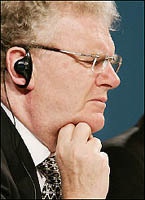Sony wields the axe to reverse profit slump
Sony boss Howard Stringer, under pressure to
reverse a slump at the Japanese icon, announced 10,000 job cuts and a swathe of
asset disposals but renewed his vision of the group as an electronics to
entertainment colossus.

Economics, even played out on a world scale, is rarely as glamorous or interesting as the daily news. But, decisions like Stringer's -- to make the balance sheet work for shareholders -- is antithetical to the long-term thinking that's been successful for decades among Asian companies.
Sony boss Howard Stringer, under pressure to reverse a slump at the Japanese icon, announced 10,000 job cuts and a swathe of asset disposals but renewed his vision of the group as an electronics to entertainment colossus.
Sony also issued its second profit-warning this year, forecasting a net loss of 10 billion yen (90 million dollars) in the year to March 2006 largely owing to one-off costs linked to the restructuring drive.
The group will axe 11 of its 65 manufacturing plants as it moves away from traditional televisions towards flat-screen TVs, its new British-born chief executive said in a keenly awaited three-year business recovery plan.
As well as shedding about seven percent of its 150,000-strong global workforce, the company will cut one-fifth of its product line.
Will Stringer’s leadership and practice be productive in the long term? Or is he in place just to be an axe-man?
He said the company would concentrate on three core sectors -- electronics, video games and entertainment. The mainstay electronics group is to be reorganized under a single decision-making structure to sharpen its focus.
Rather than backing away from entertainment as some have suggested it should, Sony plans instead to try to exploit its strengths in movies, music and games to deliver better products.
Stringer vowed to unite Sony's warring fiefdoms by breaking down "silo walls" and eliminating its "highly decentralized" structure.
------------
Sony's decision in March to hand management control to Stringer, or "Sir Howard" as he is known since being knighted by Queen Elizabeth II in 1999, sent ripples through the staid world of Japanese business.
Despite speaking no Japanese and having little technological know-how, the Welsh-born former journalist rose through the ranks to take the top job, continuing his predecessor's efforts to slim down the group.
One of the points made in the article is that the customer base once loyal to anything named Sony doesn't exist any longer. Of course, that's something that American firms have given up on, long ago. Excepting firms left with junk bond status -- like GM!
Posted: Thu - September 22, 2005 at 07:29 AM